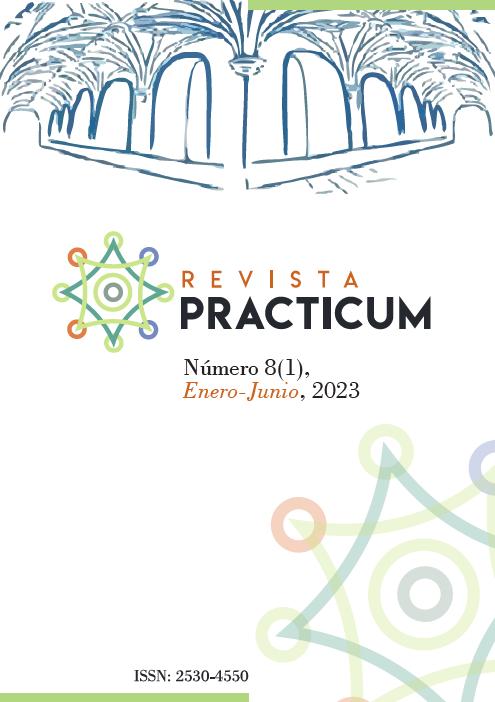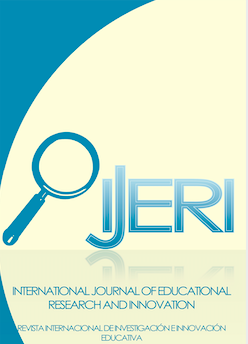Digital teaching skills self-assessment platform
DOI:
https://doi.org/10.24310/RevPracticumrep.v8i1.16717Keywords:
Teacher Evaluation, Competency-Based Teacher Education, Teacher Competency Test, Competency-based education, Teaching skillsAbstract
Education is undergoing transformation, with the massive use of digital technology in teaching and learning activities and, in this case, identifying digital teaching skills is a social demand. For this, a platform was developed for identifying and managing information, called CDD-EB, which stores, in a summarized form, a model for self-assessment of Digital Teaching Skills (CDD). The CDD-EB Model uses rubrics that guide the teacher in a self-assessment process, in which it enables an individual self-reflection process and returns, in the form of feedback on the platform itself, a summary with the teacher's CDD profile, based on the choices made. The self-assessment model was validated by experts, inserted into the CDD-EB Platform and tested by basic education teachers. Statistical validity tests, by IVC and CVC, and reliability by Cronbach's Alpha, confirm the Platform's potential as a tool for identifying digital teaching skills.
Downloads
Metrics
References
Dzhurylo, A. P. & Shpayk, O. M. (2019). ICT Competence for secondary school teachers and students in the context of education informatization: global experience and challenges for ukraine. Information Technologies and Learning Tools, 70(2), 43–58. https://lib.iitta.gov.ua/716055/1/Dzhurylo_Shparyk_ICT_Competences.pdf
Espíndola, J. De. (2015). Percepção docente sobre os indicadores de competência digital [Programa de Pós-Graduação em Educação Matemática e Tecnológica. Universidade Federal de Pernambuco]. https://repositorio.ufpe.br/handle/123456789/13879
Gilioli, S., Melo, I. B. y Dias-Trindade, S. (2019). Avaliação do nível de proficiência digital de professores : um estudo no Estado de Tocantins Introdução. 13, 113–138. https://revista.unitins.br/index.php/humanidadeseinovacao/article/view/3419
Hazar, E. (2019). A comparison between European digital competence framework and the Turkish ICT curriculum. Universal Journal of Educational Research, 7(4), 954–962. https://doi.org/10.13189/ujer.2019.070406
Instituto Nacional de Estudos e Pesquisas Educacionais Anísio Texeira (INEP). (2021). Censo da Educação Básica 2020: resumo técnico [recurso eletrônico]. https://download.inep.gov.br/publicacoes/institucionais/estatisticas_e_indicadores/resumo_tecnico_censo_escolar_2020.pdf
Navarro, D. (2021). Apuntes de consistencia interna de las puntuaciones de un instrumento de medida. Universidad de Valencia, 5–10. https://www.uv.es/friasnav/AlfaCronbach.pdf
Neaves, N. I. I., Cruz, I. M. y Oviedo, L. H. M. (2017). Proceso De Validación De Una Rúbrica Diseñada Con El Enfoque Socioformativo. Congreso Nacional de Investigación Educativa-COMIE, 1–12. https://comie.org.mx/congreso/memoriaelectronica/v14/doc/2101.pdf
Perin, E. S. (2017). Competências Docentes Digitais para o compartilhamento de Práticas e Recursos Educacionais [Universidade Federal do Paraná.]. In Programa de Pós-Graduação em Gestão da Informação. https://seer.ufrgs.br/index.php/ProdutoProducao/article/view/9321
Rego, H., Da Hora, M., Torres, G., Monteiro, R. y Arica, J. (2010). Confiabilidade em Questionários para Qualidade: Um Estudo com o Coeficiente Alfa de Cronbach [Reliability in Questionnaires for Quality: a study with the Cronbach’s alpha Coefficient]. Produto & Produção, 11(2), 85–103.
Tarouco, L. M. R. (2019). Competências Digitais dos Professores. In TIC EDUCAÇÃO 2018: Pesquisa Sobre o Uso das Tecnologias de Informação e Comunicação nas Escolas Brasileiras (pp. 33–44). https://cetic.br/media/docs/publicacoes/216410120191105/tic_edu_2018_livro_eletronico.pdf
Vieira, S. (2015). Alfa de Cronbach. http://soniavieira.blogspot.com/2015/10/alfa-de-cronbach.html
Downloads
Additional Files
Published
How to Cite
Issue
Section
License
Acceptance of the work implies that the author grants Revista Prácticum the exclusive rights to reproduce, distribute and sell his or her work worldwide, both in digital and paper formats, CD-ROM, etc.
Likewise, the authors shall grant Revista Prácticum the rights of dissemination, public communication on the Internet and IT networks, data buses, as well as any other portals or electronic devices for online consultation of its contents and extracts, under the conditions of the portal, repositories or databases where the work is stored.
Revista Prácticum allows authors to publish and disseminate their articles and works on their personal websites, research teams, institutional repositories and scientific databases. All this in accordance with the Creative Commons 4.0 License









8.png)








